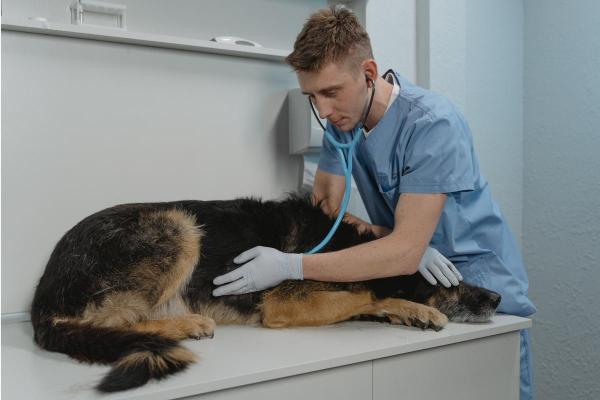Intestinal Tumor in Dogs



See files for Dogs
A tumor is a disorganized or abnormal growth of cells that occurs as a result of a genetic mutation. They can affect almost any tissue in the body where cells are able to divide and multiply, although they are more common in some areas than others. Intestinal tumors are not the most common in dogs, but they do have a relatively high prevalence. Since they occur on internal tissues of the body, they can be more difficult to observe. For this reason, we need to look for symptoms which might indicate their presence. There are different types of canine intestinal tumor, presenting different risks to the dog's health and well-being.
AnimalWised looks at the symptoms, types and treatment of intestinal tumors in dogs. We understand how the different types of tumor can affect their health, helping us to know what to expect in terms of prognosis.
What is an intestinal tumor in dogs?
Known scientifically as a neoplasm, a tumor is defined as the disorganized growth of cells that occurs as a result of a genetic mutation. This mutation can be induced by different factors such as radiation, chemicals or hormone changes. In most cases, an intestinal tumor in a dog is idiopathic, meaning its origin is unknown or cannot be determined.
An intestinal tumor is a type of neoplasm that originates in the cells that make up the intestine. They can present in either the large or small intestine. Gastrointestinal tumors encompass these neoplasia, but also include other parts of the gastrointestinal system such as the stomach or rectum. The type of intestinal tumor that presents in dogs is dependent on the type or strain of cell that proliferates.
Intestinal tumors in dogs usually appear at an average age of 6-9 years. These types of tumors in dogs are relatively rare, representing less than 10% of total neoplasias in this species. When they do appear, many of them tend to be malignant tumors. The genetic influence means that they more commonly affect male dogs than females[1].
Types of intestinal tumor in dogs
As we have already stated, the type of tumor with which the dog presents will depend on the type of cell which is proliferating. The two different types of intestine also more commonly present certain types of canine tumor.
Small intestine tumors in dogs
Some of the most common tumors of the small intestine include:
- Carcinomas: malignant tumors that originate in epithelial cells.
- Lymphosarcomas: malignant tumors that originate in lymphocytes.
Large intestine tumors in dogs
Since the colon is the largest part of the large intestine, colon tumors in dogs are most common. They include:
- Adenomas: benign tumors that originate in epithelial cells.
- Carcinomas: malignant tumors that originate in epithelial cells.
- Lymphosarcomas: malignant tumors that originate in lymphocytes.
- Leiomyomas: benign tumors that originate in muscle cells.
- Leiomyosarcomas: malignant tumors that originate in muscle cells.
- Stromal tumors: malignant tumors that originate in mesenchymal cells.
While these types of intestinal tumor are categorized by the part of the gastrointestinal system they affect, they are also categorized by their danger. They can either be benign or malignant, the latter meaning they are a type of canine cancer. They have a risk of metastasis, meaning they can spread to other tissues. Even benign intestinal tumors can cause problems, especially when they grow large.
Learn about another type of abdominal cancer in dogs with our article on canine spleen tumors.
Symptoms of intestinal tumors in dogs
The symptoms of intestinal tumors vary depending on the section of the intestine that is affected. Small intestine tumors in dogs (both carcinoma and lymphosarcoma) usually cause the following symptoms:
- Vomiting
- Chronic diarrhea
- Abdominal pain
- Appetite changes
- Weight loss
Large intestine tumors often cause:
- Stools with mucus
- Stools with fresh blood
- Tenesmus (inefficient or painful straining to defecate)
- Dyschezia (general difficulty in defecation)
The reason for these differing symptomologies is the location of the tumor. The small intestine is closer to the mouth and the large intestine is closer to the anus, meaning symptoms more commonly affect one or the other. If the tumor is sufficiently large or cancer has spread, both small and large intestines may be affected.
Learn about other reasons a dog may have blood in their feces with our related article.

Diagnosing intestinal tumors in dogs
The diagnosis of an intestinal tumor or cancer in dogs is based on the following factors:
- Clinical diagnosis: based on the symptoms which will be different in small intestine tumors and in large intestine tumors.
- Diagnostic imaging: X-rays provide little information in diagnosing or assessing intestinal tumors in dogs due to their poor imaging of certain tissues. Ultrasound can help guide the diagnosis, since it can show an increase in the thickness of the intestinal wall, as well as a possible associated lymphadenopathy (i.e. enlargement of the lymph nodes near the tumor).
- Histopathological diagnosis: by taking a tissue sample (biopsy) and analyzing it under the microscope. The sample or biopsy can be taken in two ways, either by endoscopy or by exploratory laparotomy. In an endoscopy, a camera is introduced orally or rectally (depending on whether a sample is to be taken from the small intestine or the large intestine. It is a less invasive technique, but it cannot be used in all cases, since not all sections of the intestine are accessible by endoscopy. Only the beginning of the small intestine and the end of the large intestine can be reached this way. When the tumor is located in a section of the intestine that is not accessible, an exploratory laparotomy must be performed. This consists of surgery in which the abdominal cavity is opened to explore it and take samples. Histopathological analysis is the most effective diagnostic test, since it is the only one that allows us to know the exact origin of the tumor, its degree of malignancy and the invasive characteristics in the surrounding tissues.
- Molecular diagnosis: new diagnostic techniques have recently emerged, such as PCR (Polymerase Chain Reaction) that allow the detection of tumor genes. They may not be available to all veterinarians.
While intestinal tumors are more common in male dogs, some tumors are equally prevalent in both sexes. Learn about one with our article on mast cell tumors in dogs.
Treatment for intestinal tumors in dogs
Treatment of intestinal tumors in dogs must be considered taking into account two main factors:
- Type of tumor: its location, whether it is a localized or diffuse tumor, whether there is metastasis in other organs and other factors will mean surgical or chemotherapy treatment may be proposed.
- General condition of the patient: only stable patients will be able to undergo treatment, whether surgical intervention or chemotherapy.
Surgery
This is the most effective form of intestinal tumor treatment for dogs with localized tumors that have not metastasized. It can also be used as palliative treatment in patients in whom the tumor obstructs the intestine, even if it has already metastasized to other organs. Whenever possible, curative excision should be attempted. This means the tumor should be removed along with a 4 cm safety margin around it.
Chemotherapy
It can be used in two ways:
- As a complement to surgery when curative resection is not possible.
- As a single treatment for tumors in which surgical removal is not possible (such as lymphoma in dogs).
Generally, multi-drug protocols are used, such as the well-known Wisconsin-Madison protocol.

How long can a dog live with intestinal cancer?
The life expectancy of a dog with an intestinal tumor depends on several factors which affect the prognosis. They include:
- The type of tumor and its location.
- The degree of malignancy.
- The tendency of the type of cancer to metastasize to other organs.
- The general condition of the anima, depending on the advancement of the tumor and whether there are other concomitant pathologies.
- Treatment is also a very important factor sine dogs that do not undergo any treatment have a shorter life expectancy than those that undergo a specific treatment (even if it is not curative)
Below we mention the prognosis of the most common intestinal tumors in dogs:
- Adenocarcinoma: the prognosis varies depending on the location of the cancer. When it affects the small intestine, life expectancy is 4-18 months. In the large intestine, life expectancy is longer with an average of 2-4 years after surgery.
- Leiomyosarcoma and stromal tumor: both usually have a good prognosis if they can be surgically removed. Life expectancy in these cases is usually 3 years.
- Lymphoma: the prognosis depends largely on the degree of differentiation and the degree of malignancy. In poorly differentiated and high-grade lymphomas, survival is usually less than 3 months. In well-differentiated and low-grade lymphomas, life expectancy can reach 2 years or more. In the case of large intestine lymphoma, the prognosis is particularly good, with survival of up to 6 years after an adequate chemotherapy protocol.
If you notice any of the symptoms of intestinal tumor in your dog, do not hesitate and go to the vet immediately. Acting in time also influences the prognosis of the disease.
Discover a rare form of cancer in dogs which is exclusive to this animal with our article one transmissible venereal tumors (TVTs) in dogs.

This article is purely informative. AnimalWised does not have the authority to prescribe any veterinary treatment or create a diagnosis. We invite you to take your pet to the veterinarian if they are suffering from any condition or pain.
If you want to read similar articles to Intestinal Tumor in Dogs, we recommend you visit our Intestinal problems category.
1. Pinello, K., Pires, I., Castro, A. F., Carvalho, P. T., Santos, A., de Matos, A., Queiroga, F., Canadas-Sousa, A., Dias-Pereira, P., Catarino, J., Faísca, P., Branco, S., Lopes, C., Marcos, F., Peleteiro, M. C., Pissarra, H., Ruivo, P., Magalhães, R., Severo, M., & Niza-Ribeiro, J. (2022). Cross Species Analysis and Comparison of Tumors in Dogs and Cats, by Age, Sex, Topography and Main Morphologies. Data from Vet-OncoNet. Veterinary sciences, 9(4), 167.
https://doi.org/10.3390/vetsci9040167







